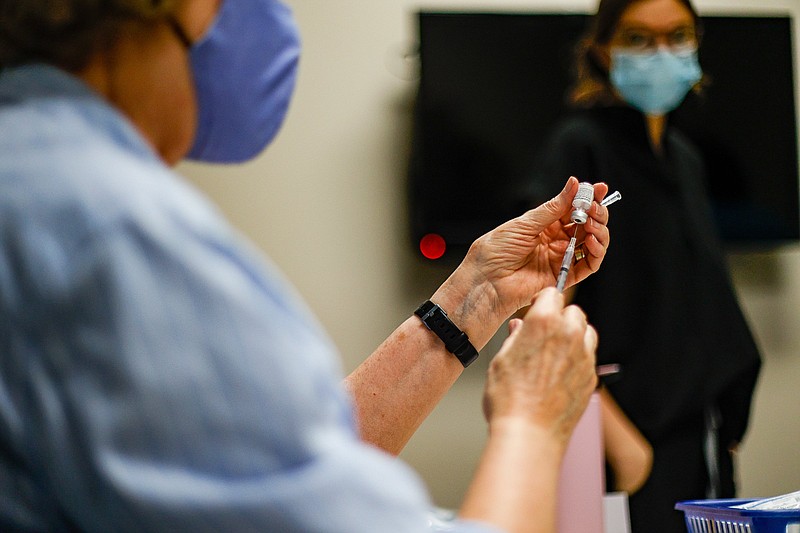The proportion of serious and fatal COVID-19 infections among vaccinated Tennesseans is growing, but experts caution against using data on "breakthrough" infections - which occur when fully vaccinated people are infected by the coronavirus - to draw broad conclusions about vaccine efficacy.
Unvaccinated Tennesseans continue to account for the majority of COVID-19 hospitalizations and deaths in the state.
But the proportion of patients who are fully vaccinated has increased threefold or more, according to the latest COVID-19 Critical Indicators report from the Tennessee Department of Health:
- The vaccinated made up 13% of all COVID-19 cases in Tennessee in August, compared to 4% in May.
- Among those hospitalized with COVID-19, 14% were vaccinated in August, compared to 5% in May.
- The vaccinated made up 17% of COVID-19 deaths in August, up from 3% in May.
Dr. Jason Andrews, associate professor of medicine in the infectious diseases division at the Stanford University School of Medicine, said although protection from the vaccines against symptomatic COVID-19 infections has fallen since the initial vaccine trial data was released, there are many other factors driving an increase in breakthrough cases, and the vaccines' ability to protect against hospitalization and death remains strong.
New coronavirus variants and waning immunity over time are both likely contributing to decreased COVID-19 vaccine efficacy, he said. But breakthrough infections are also more likely during periods of high community spread, which has increased significantly since early July as a result of the summer surge.
Unlike large-scale studies, raw breakthrough case reports do not control for factors such as age and medical conditions, and older adults and people with underlying conditions are the groups with the highest vaccination rates. These same groups are at higher risk for serious COVID-19 illness and death, regardless of vaccination status.
"So, if we just look at the [COVID-19] deaths and hospitalizations and look at the proportion that are vaccinated, you may see a higher proportion than you would expect among people who are vaccinated. But that's very likely because most of the deaths are coming from those who are [older] or have medical conditions," Andrews said.
Vaccines are also typically less effective in adults and people with weakened immune systems.
"It probably is the case that we're seeing waning [immunity] more in elderly individuals and people with compromised immune systems," he said.
"Vaccines are not perfect - that's the reality. Very few things in life are perfect," Andrews said. "We do things because they reduce our risk, even if they're not perfect, and we know very clearly that vaccines reduce our chances of hospitalization and death by at least 90%."
The Tennessee Department of Health also notes that COVID-19 hospitalizations in vaccinated people are investigated more rigorously than unvaccinated people, so the number of hospitalizations in unvaccinated people is likely an undercount.
Real-time breakthrough case data is not available, and summary breakthrough case data for Tennessee is only available through August because it takes weeks to properly investigate the cases.
The department links its immunization registry to its testing data to calculate the number of general breakthrough cases, which should be considered an undercount given that not all COVID-19 positive people seek testing.
Andrews said the mRNA vaccines, Pfizer and Moderna, set the bar extremely high when initial data showed the vaccines were around 95% effective at preventing symptomatic infection, when historically vaccines for respiratory viruses such as influenza aim for around 60-70% efficacy.
Now, the scientific community is trying to determine how COVID-19 vaccine efficacy is evolving in order to determine who may need booster shots and when.
"Those are the debates that are happening right now," Andrews said. "Given that we were able to achieve such high effectiveness, we're continuing to strive for that, because our whole goal as a medical and public health community is to reduce disease as much as possible, including transmission."
While breakthrough cases are a concern, he said the biggest concern is that a large portion of the population remains unvaccinated.
A total of 296 breakthrough deaths and 769 hospitalizations have been reported throughout the pandemic, according to the latest Critical Indicators report, and more than 3.1 million Tennesseans have been fully vaccinated, according to the department of health.
Contact Elizabeth Fite at efite@timesfreepress.com or follow her on Twitter @ecfite.
